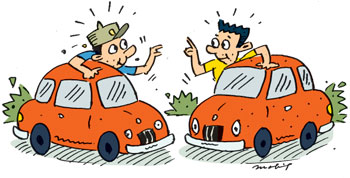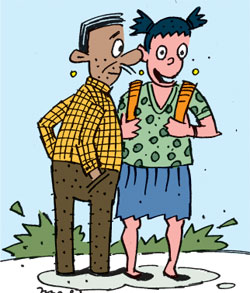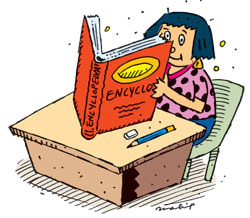|

by R. S. Karunaratne
Correct use of 'as'
and 'like'
Many students and even some adults use 'as' and 'like'
indiscriminately. So, you hear some incorrect sentences like the
following:
My father works like a
clerk. (use 'as')
He works as a bull! (use 'like')
|

Your car is just like mine. |
'As' can
be used to say that something happened while something else was
happening.
The people cheered their leader as
he stepped out of the plane.
As I was writing an essay,
the bell rang.
Malka wept bitterly as she told her story.
'As' is
used to give a reason for doing something.
You may drive the car,as you have a licence .
'As'
you know, I don't like to wait in the queue.
As he is a fool, you can take him for a ride!
'As'
can be used to compare two things, or
people,
In this construction we use 'as and
as'.
Amanda is as tall as her father.
She answered the questions as best as she could.
Meet me as soon as possible.
'As'
is sometimes used to talk about
appearances.
You sound as though you have got a good knowledge of the subject.
He talks as if he knows
everything.
She looked at me as if I were a stranger.
'As'
can stand for 'because'.
As you are late, you have to apply for leave.
|

Amanda is as tall
as her father. |
'Like'
is used to talk about things or people that please you.
How do you like my new
house?
I like you very much.
Do you like fish?
'Like'
can be used to talk about activities you
enjoy.
Shanthi likes reading in
buses.
Gowry likes to gossip with her neighbours.
I like to collect stamps.
'Like'
is used to talk about what
you prefer to do.
Namal likes to get up early in the morning.
I would like to read your
essay.
The director likes to interview all the applicants.
'Like'
can be used to say what you
prefer other people to do.
The new director liked us calling him 'Sir'.
I'd like you to do medicine instead of law.
'Like'
is used to talk about
similarities between people things or actions.
Your car is just like mine.
You look like your father.
'Like' is used in certain
set phrases.
Would you like a cup of coffee?
How do you like his speech?
You can have a short break now, if you
like.
What I like about Sam is
his sense of humour.
I don't like the way you
drive.
What's your classroom like?
Do it like this.
Starters:
How to use an
encyclopedia
A n encyclopedia is a book or set of books that gives you information
on many subjects. (The word 'encyclopedia' is also spelt encyclopaedia').
The facts are arranged for reference, usually in alphabetical order.
An encyclopedia contains short and clear articles on many kinds of
subjects. As all the information cannot be given in one book, an
encyclopedia usually comes in many volumes which are numbered.

Some useful hints on the use of an encyclopedia:
If you seek information on a particular subject, first refer to the
index which is usually a separate volume.
If the subject is a person, look up the person's last name to find
information about him. For instance, if you wish to gather some
information about William Shakespeare, refer to 'Shakespeare'.
If you find it difficult to get the information, try to think of
another subject to look up. For instance, if you want to find something
about a folk musician, refer to 'music' 'folk music' or 'folk singing'.
Sometimes, you may not find all the information in one volume. Be
prepared to refer to several other volumes if the need arises.
An encyclopedia is a very useful set of books which should be in your
private library. As the price of an encyclopedia is prohibitive (very
high), you can refer to it in your school or public library.As these
books are expensive and precious, never tear the pages or disfigure them
when you use an encyclopedia.
Articles in an encyclopedia are called 'entries'. The title of an
article is called an 'entry word'. An entry word is usually printed in
bold type.
At the top of encyclopedia pages you will find 'guide words.' The
alphabetical order of guide words and entry words will help you to find
the information you want. |

